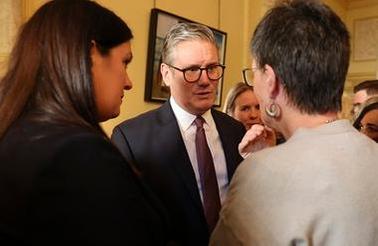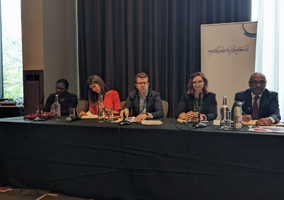Last week, another step towards the hotly anticipated Civil Society Covenant was taken as a consultation with the charity sector closed.
The covenant, which prime minister Keir Starmer said would signify a “fundamental reset” of the government’s working relationship with civil society, is set to be finalised next year.
It will essentially replace the Compact, first published a quarter of a century ago by Tony Blair’s Labour government before being updated by David Cameron’s coalition administration in 2010.
The original Compact followed a recommendation for a “concordat” by Nicholas Deakin’s independent commission into the future of the voluntary sector.
Charities have long called for the Compact to be updated. Now it is, what do they want from the covenant – and will the new C-word agreement deliver the change the sector needs?
What happened to the Compact?
The 1998 Compact, authored by the late civil servant Kenneth Stowe and published by the Home Office as part of Blair’s vision for a “third way” between the public and private sectors, was underpinned by codes of practice on topics such volunteering and working with Black and ethnic minority groups.
Dozens of local compacts were published as a result, some still in use, setting out the relationships between local government organisations and charities.
Then in 2010, the coalition government simplified the Compact to a single 16-pager, as part of Cameron’s “big society” agenda, which listed five aims:
- A strong, diverse and independent civil society
- Effective and transparent design and development of policies, programmes and public services
- Responsive and high-quality programmes and services
- Clear arrangements for managing changes to programmes and services
- An equal and fair society
Cameron said at the time: “The Compact plays a crucial part in improving the partnership between the government and civil society organisations, for the benefit of citizens and communities. Looking forward, the role of this sector has never been more important.
“Building the big society and getting citizens more engaged, involved and responsible for the communities around them will only be possible in partnership with the sector; improving and delivering better, more responsive public services can only be done with the help of the sector; and empowering communities can only work where the skills, enthusiasm and commitment of the sector is harnessed.”
Charity umbrella bodies backed Cameron’s updated Compact, with former NCVO chief executive Stuart Etherington and ex-ACEVO boss Stephen Bubb signing a statement of support.
Etherington tells Civil Society the NCVO once forced the government to drop plans to use contract clauses to prevent charities campaigning. It threatened a judicial review, citing a pledge made in the document to “respect and uphold” civil society bodies’ right to campaign “regardless of any relationship, financial or otherwise”.
A year after the Compact was renewed, the Commission for the Compact, which had independently overseen the agreement since its original publication, was abolished with its role absorbed by the government and NCVO’s sector champion Compact Voice.
The civil society minister who had led the refreshed Compact, Nick Hurd, moved on in 2014. Brooks Newmark, his replacement, insisted charities should “stick to their knitting” and stay out of politics.
Cameron and his big society agenda then exited 10 Downing Street in 2016 following his failed campaign in the EU referendum.
Compact Voice, which provided resources for improving relationships between voluntary and public sector bodies, itself stopped operating in 2017.
Relationships between the government and charities became increasingly strained since, with sector funding from national and local public bodies declining as austerity continued.
While the Compact still exists, Etherington reflects, it and the local agreements it spawned have “faded away a bit”.
How might the covenant differ?
One essential way in which the covenant will be different is that it aims to cover the whole UK, not just England.
The covenant framework proposes four key principles:
- Recognition – to ensure a strong and independent civil society
- Partnership – to ensure effective service delivery and policy-making
- Participation – to ensure people and communities can be heard and make a difference
- Transparency – to ensure civil society and government have the information needed to best serve people and communities
On the surface, these are similar to the five in Cameron’s 2010 Compact, with the two “programmes and services” aims combined.
The most original covenant principle, perhaps, is participation. NCVO has said it wants that principle to include a commitment to protecting communities’ right to peaceful protest and legitimate campaigning. The umbrella body has also said it wishes to see charities’ own right to campaign enshrined in the final covenant.
From recent comments in parliament, which contrast to Newmark’s a decade earlier, culture secretary Lisa Nandy seems on the same page.
“We are very keen [charities] understand they don’t just have a right but a duty to speak up on behalf of their beneficiaries when they think we’re getting things wrong,” she told the Culture, Media and Sport Committee on 10 December. “We will make better decisions as a government if they understand that’s the relationship we want.”
Nandy also said: “We’re calling it a covenant this time because one of my reflections on [the Compact] as someone that was in the voluntary sector is that […] it was more like a contract than a genuine partnership, and I think ultimately that’s why it didn’t survive.”
Another contrast with both the original Compact and its 2010 update is that the new covenant is being driven by women.
Starmer has, of course, voiced support. But ACEVO chief executive Jane Ide, NCVO boss Sarah Elliott and Nandy head up the three institutions tasked with putting it together.
Will the covenant produce meaningful results?
What do Bubb and Etherington, who backed the refreshed Compact in 2010, think of the covenant proposals?
“This is a good thing, but we need more than fine words,” says Bubb.
“We need action, particularly in terms of public service reform,” he adds. “I’d be looking for some serious cultural shifts in government departments, to thinking about how the challenges they face can be solved by the intervention of charities. So far, we haven’t seen that.”
Bubb cites chancellor Rachel Reeves’ plans to seek the “expertise and innovation of the private sector” in her spending review, without mentioning civil society.
“You can have a covenant – but if a government department like the Treasury completely ignores the role of charities when it asks departments to review their spending plans, we’re in a bad place,” he says.
“And I do find it slightly extraordinary, with a government that has such a wealth of talent from the sector. But I think it’s partly that civil servants and policymakers have forgotten us].”
Etherington agrees the work putting together the covenant is “a good thing”, and says this process might be as important as the final product. But he says the finished covenant must contain actionable content.
“In the old Compact, there were lots of warm words, but there needs to be some tangible stuff, like the clause about recognising the right to campaign,” he says.
“Also the process of consultation is, I think, more important than it sounds,” Etherington adds. “So, if there’s a policy that might directly or indirectly impact the voluntary sector, then there is at least some consultation on that.
“My feeling, having been there a long time, was that the main government doesn’t set out to hurt the sector. What was much more common was that they didn’t recognise that what they were doing would have implications for the voluntary sector, and so they stumbled.”
Meanwhile, Stonewall CEO Simon Blake, who previously chaired Compact Voice, believes a framework such as the covenant can drive productive conversation, engagement, and collaboration.
“But if it becomes a rigid rule book it can drive frustration and cause people to become disenfranchised,” he says.
“A set of guiding principles, which all parties are committed to, particularly at a local level, can be incredibly powerful in setting the terms of the relationship, even in tough times,” Blake says.
“Any partnership must be underpinned by a recognition of different partners’ roles and responsibilities, a genuine understanding of the role of the voluntary and community sector and a commitment to openness, transparency and honesty.”
Risks of being ‘seduced by government’
In Parliament last month, the CEO of a local infrastructure organisation said it was “poor timing” for the covenant, given the government’s recent announcement of an increase to employer national insurance contributions (NICs), estimated to increase charities’ costs by £1.4bn a year.
Former Lloyds Bank Foundation CEO Paul Streets says charities should avoid being “seduced by government” through the covenant scheme and must maintain their independence so they can effectively challenge policies such as the NICs rise that could impede their work.
“Let’s see some tangible action that demonstrates the covenant as more than a set of words,” he says.
“If I saw something that’s really going to make a difference to small charities, [and] to the people they are trying to serve, I’d begin to say, yes, it’s worth doing.
“But we’re starting really cautious. I’m sure NCVO and ACEVO, between them, will do what they can to get the best out of it. But it’s very seductive being invited into the centre of government and appearing to be right in the centre of power.”
Responding to those concerns, Ide of ACEVO says the covenant work “isn’t about being best buddies” and that her organisation’s conversations with ministers over the NICs rise were “anything but cosy”.
“Our job in this context is to create a framework that is of positive value for our sector. They are not asking us to abdicate our right and responsibility to challenge government, or indeed anybody else, when they are saying or doing things not in our sector’s interest,” Ide says.
Ide says Nandy was explicit “in our first conversation” that she wants to hear when the government gets things wrong. “Whether they listen is another thing,” she adds.
“I tend to work on the basis that being constructive is generally more helpful than not.
“But if there comes a point, as there was in the previous administration, if there are things that we feel are crossing a line and are undermining our sector’s rights and our ability to operate, we will challenge and I’ll have no qualms about that.”
What next?
Ahead of NCVO’s covenant consultation closing last week, it told Civil Society that around 400 people had responded while over 300 had signed up to its online workshop.
DCMS has also been speaking to other departments, devolved governments and arms-length bodies, as well as local authorities and mayoral combined authorities.
While consultation responses are being analysed, NCVO policy manager Rebecca Young says “there has been a view from some that the Compact was too service delivery-focused, or too focused on bringing organisations into supply chains”.
“Our view on the covenant is that it needs to support all the functions of civil society” – including service delivery, social business, campaigning, community building – and to work across them, Young says.
Young notes that despite the covenant’s UK-wide scope, it is not being designed to replace other initiatives outside England, nor local projects such as the Greater Manchester Accord.
Meanwhile, there are no plans to create a sector champion for the covenant, akin to Compact Voice, nor an independent body to oversee its implementation, like the Commission for the Compact.
Looking further ahead, Streets says the covenant’s rollout will be particularly important for small charities, who rely more on local than central government.
“What impact is a covenant going to have on the relationship between the local authorities and charities? And actually the fundamental thing is proper funding of local authorities,” Streets says. “From my experience, many local authorities are not unsympathetic to charities, but they’re really screwed for money, so that is a big issue.”
For its part, the Local Government Association recently produced two pieces of guidance to improve relationships between councils and charities.
Ide says the consultation is “the beginning of the beginning” and that the onus is on the sector, as well as government, to ensure the covenant delivers positive change.
“I think we will have to have something concrete that people can start to use. But as we know from the Compact, these things take on the life of their own and it can be a good life or it can be a less good life,” she says.
“And that’s up to us and the people that we have working relationships with. We’ve all got to make it happen. So it’s an opportunity, and it’d be an absolute shame if we wasted that. So we’ll take it with both hands and see what we can do with it.”
Related articles












